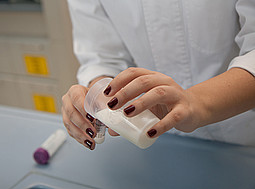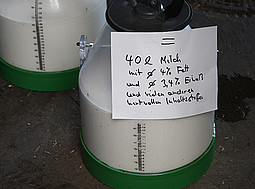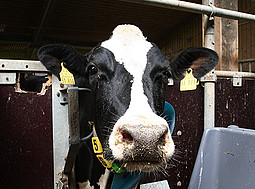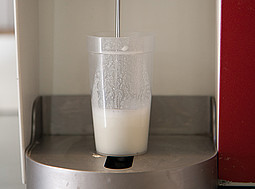Expert list milk quota
Since 1 April 2015, the milk quota is a thing of the past. In January 2015, the Expert List Milk Quota with economists, environmental experts, and animal and food scientists at the University of Hohenheim who are available as contacts on the topic was created in light of the end of the quota. (As of: 2015)
1 Economic consequences
Strategies and reactions of dairy farmers and dairy cooperatives

The expiration of the milk quota regulations at the end of March 2015 will confront the EU dairy producers with changed market conditions. Which adaptation strategies Baden-Württemberg companies are developing and how this will affect the structural change is what agricultural economist Prof. Dr. Reiner Doluschitz is looking at together with the agricultural engineer Pamela Lavèn. In their study, they asked dairy farmers in Baden-Württemberg about their reactions to the expiration of the milk quota regulation.
In addition, Prof. Dr. Doluschitz constantly deals with questions on the topic of cooperatives including dairy cooperatives in his capacity as the Director of the Research Centre of Cooperatives.
Contact: Prof. Dr. Reiner Doluschitz and Dipl.-Ing. agr. Pamela Lavèn, Department of Computer Applications and Business Management in Agriculture, +49 711 459 22841, E-mail
Computer simulations on the end of the quota
The end of the milk quota will have serious consequences for the agricultural markets. For example, the milk prices will change. In order to better estimate these effects on the European agricultural sector, Prof. Dr. Harald Grethe has modelled the end of the quota on the computer in various projects.
Contact: Prof. Dr. Harald Grethe, Department of Agricultural and Food Policy, 0711 459 22631, E-mail
Business and Environmental-Economic Aspects of Milk Production

Prof. Dr. Enno Bahrs and his staff member Dr. Lukas Kiefer focus on dairy production from a business and environmental-economic perspective. The topics that are dealt with in the area of Farm Management include, for example:
- Profitability of ecological and conventional dairy animal operations
- Strategies to improve the use of feed in “disadvantaged areas” of Baden-Württemberg in the post milk quota era
- Effects of fodder needs on greenhouse gas emissions and energy balances
- Studies on the CO2 footprint for milk from south-German production.
Contact: Prof. Dr. Enno Bahrs and Dr. Lukas Kiefer, Department of Farm Management, +49 711 459 22566, E-mail
The milk market after the milk quota
The milk quota has decisively influenced the milk market in Europe over a long period of time. Prof. Dr. Tilman Becker of Department of Agricultural Policy and Markets is studying how the end of the milk quota has influenced the markets.
Contact: Prof. Dr. Tilman Becker, Department of Agricultural Markets and Marketing, +49 711 459 22599, E-mail
2 Animal science aspects
Needs-based feeding of cattle and the consequences for the environment

The end of the milk quota can affect the size of herds and production capacity and thus also change the feeding of dairy cattle. A needs-based feeding system for the animals in relation to energy, nutrients, and structure is the area in which Dr. Herbert Steingaß does his research.
Changed intensity of feeding by increasing or decreasing the amount of concentrated feed influences milk production and milk composition, but it also relates to the health of the dairy cattle with the provision of structured feed. A change in the amount of protein given has consequences for the nitrogen-use efficiency and nitrogen excretion; the same applies to phosphorous.
Contact: Dr. Herbert Steingaß, Department of Animal Nutrition, +49 +711 459 22419, E-mail
Effects of the end of the quota on cattle breeding
The removal of the quota regulation will also place new requirements on animal breeding. Prof. Dr. Jörn Bennewitz of the Department of Farm Animal Genetics and Breeding uses his research to examine how the cattle population will need to be genetically developed in the future.
Contact: Prof. Dr. Jörn Bennewitz, Department of Farm Animal Genetics and Breeding, +49 711 459 23570, E-mail
3 Consequences for food sciences
Dairy technology: New techniques, products, and export requirements

Questions on improving the efficiency and added value in milk-processing companies are indirectly relevant for the price of milk. This is where the work of Prof. Dr.-Ing. Jörg Hinrichs begins. He studies milk-technological processes in order to design them more efficiently, use by-products, and thus increase the competitiveness of milk-processing companies.
The end of the milk quota will also likely have an effect on the export numbers. Today, Asia and particularly China is already a large market for non-perishable dairy products. Hinrichs’ work aims to ensure that the goods have a long shelf-life and the quality is preserved for the customer.
One of Prof. Dr. Hinrichs’ other research areas are specialty products such as, for example, milk-based ingredients for infant formula. Here, he is expecting greater demand for safe products with high quality due to growing prosperity.
Contact: Prof. Dr.-Ing. Jörg Hinrichs, Department of Dairy Science and Dairy Technology, +49 711 459 23792, E-mail
4 Consequences for the environment
Greenhouse gases and competition for food
The elimination of the milk quota influences the size of dairy animal herds. This can not only have negative effects on the environment due to increased methane gases, but also increases the competition for food with people. Currently, cattle are primarily fed with concentrated feed that is made from grain products and thus also suitable for human nutrition.
Jun.-Prof. Dr. Uta Dickhöfer is looking at how grassland resources can be used optimally across the globe. At the moment, the capacity of cattle to digest green fodder is not used enough. Jun.-Prof. Dr. Dickhöfer studies how grassland-based cattle herds can achieve the highest yields per hectare without negative consequences for the field use, for example for carbon storage and biodiversity. Her studies look at dairy animal systems in these latitudes as well as in the tropics and subtropics.
Contact: Jun.-Prof. Dr. Uta Dickhöfer, Livestock Nutrition and Rangeland Management in the Tropics and Subtropics, +49 711 459 23650, E-mail
